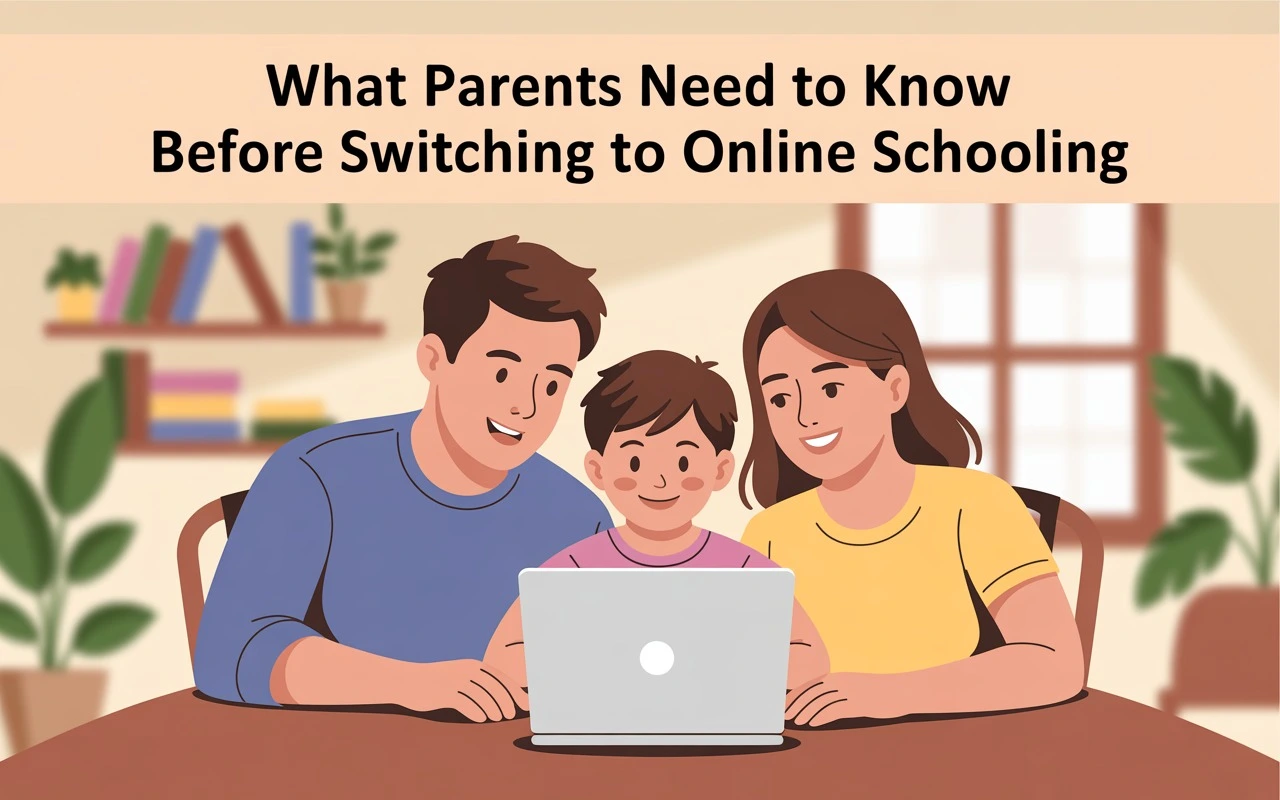What Parents Need to Know Before Switching to Online Schooling




As a parent, ensuring the best learning environment for your child is a top priority. With the growing popularity of digital learning, many families are considering a shift to online education.
But before making this significant change, it's important to understand what online schooling is, how it works, its benefits, and the pros and cons involved.

This guide drives you through everything parents need to know to support their child’s successful transition to online schooling.
Online schooling is a mode of education where students learn virtually through internet-based platforms instead of attending traditional in-person classrooms.
Lessons are delivered via live sessions, recorded videos, or a combination of both, and students interact with teachers and peers through online tools such as chats, forums, and video calls.
Read more about: What is Online Schooling in India? A Complete Guide for Parents and Students
Online schooling is conducted by qualified teachers and follows a structured curriculum.
Online education offers several unique advantages, especially for modern learners and busy families:
Students can attend classes and complete assignments from anywhere, at any time, making it easier to balance academics with extracurriculars or family commitments.
Many online programs adapt to individual learning styles and speeds. Whether your child learns quickly or needs extra time, online learning allows for a customized pace.
Students can use a wide range of resources—educational games, video lectures, e-books, and interactive tools—to support different learning preferences.
Online learning teaches vital life skills like time management, self-discipline, and digital literacy, which are crucial for future academic and career success.
Pros | Cons |
| Flexibility – Students can learn at their own pace and schedule. | Lack of Social Interaction – Limited face-to-face communication may affect social development. |
| Personalized Learning – Courses can be tailored to individual needs. | Requires Self-Discipline – Students need to be self-motivated and organized. |
| Access to Diverse Resources – Videos, e-books, quizzes, and more. | Screen Time Overload – Prolonged digital exposure may impact health. |
| Safe Learning Environment – Learn from the comfort of home. | Technical Issues – Learning can be disrupted by poor connectivity or device failure. |
| Support for Different Learning Styles – Visual, auditory, or kinesthetic learners can thrive. | Parental Involvement is Essential – Parents must invest time and effort to support their child’s learning. |
| Ideal for Remote or Frequent Travelers – Location is not a barrier. | Limited Extracurricular Opportunities – Fewer chances for sports or creative activities. |
To know more about the Pros & Cons of online school, check out the in-depth blog below-
Today, many students and parents are asking an important question: Should I choose online education or go with traditional schooling? With online learning becoming more popular and easier to access, it’s natural to compare both options. This guide will help you understand the main differences between the two so you can pick what works best for you.
Want a deeper look? Read our full blog on Online vs. Traditional Education: The Key Differences You Need to Know.
Making the shift to online schooling can be smoother with the right preparation. Here are 8 key areas to focus on:
Create a daily routine with fixed study hours, breaks, and screen-free time. Talk to your child about attendance, assignment deadlines, and respectful behavior during virtual classes.
Spend time exploring the school’s learning management system. Learn how to access lessons, submit work, track grades, and communicate with teachers.
Set up a clean, quiet, and well-lit workspace free from distractions. Keep all essentials like notebooks, chargers, and stationery close by.
Check in regularly with your child to understand their workload, concerns, and wins. Build a connection with teachers and use parent dashboards to monitor progress.
Encourage your child to join online clubs, group projects, or community activities. Where possible, arrange offline meet-ups or playdates to foster friendships.
Make sure your child has access to a laptop or tablet and a stable internet connection. Consider having a backup plan for connectivity issues.
Evaluate the school’s accreditation, curriculum quality, teaching methods, tech support, flexibility, and social offerings before enrolling.
Talk openly with your child about the upcoming change. Address their concerns and maintain a positive tone about the new learning experience.
As a parent, choosing the right type of education for your child can feel overwhelming. Some families prefer homeschooling, while others stick with regular schools. Both have their own pros and cons. What matters most is finding what fits your child’s learning style and your family’s routine.
Want to explore this in more detail? Read our full blog on Homeschooling vs. Traditional Schooling: Pros, Cons, and What Works Best.
Before you enroll your child, assess the following:
Switching to online schooling is more than just a location change, it’s a shift in mindset, routine, and learning style. When done right, it opens up a world of opportunities for personalized, flexible, and skill-rich education.
As a parent, your role in guiding, supporting, and staying involved is the cornerstone of your child’s success in this new format.
Explore personalized learning solutions and parent-friendly resources at Interval Learning to make the best educational decisions today. Contact us today!
Online schooling is a form of education where students learn through digital platforms instead of attending a traditional classroom. It includes live or recorded lectures, digital assignments, and assessments accessed via the internet.
Yes, when done right. With proper structure, active parental support, and a recognized curriculum, online schooling can be just as effective—sometimes even more so—for many students.
Online schooling is suitable for most age groups, though younger children (under 10) may need more guidance and supervision. Older students often benefit more from the flexibility and independence it offers.
A stable internet connection, a laptop or tablet, headphones, and a quiet study area are essential. Some schools may also require certain software or apps to attend classes and submit assignments
Parental involvement is crucial, especially in the beginning. Parents need to monitor progress, communicate with teachers, and help their child manage time, stay motivated, and troubleshoot tech issues.
Yes. Good online schools offer virtual clubs, group projects, discussion boards, and sometimes offline meetups or extracurriculars to encourage socialization.
Check for accreditation, curriculum recognition, qualified staff, and reviews. In India, look for approval from bodies like NIOS, CBSE, or state education boards.
Not if the online school is accredited. Colleges recognize valid online programs as long as they follow proper academic standards.